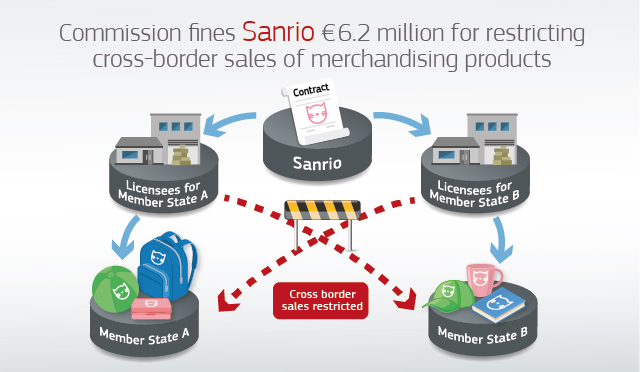Antitrust: Commission fines Sanrio €6.2 million for restricting cross-border sales of merchandising products featuring Hello Kitty characters
The European Commission has fined Sanrio €6.2 million for banning traders from selling licensed merchandise to other countries within the EEA. This restriction concerned products featuring Hello Kitty or other characters owned by Sanrio.
Commissioner Margrethe Vestager, in charge of competition policy, said:“Today’s decision confirms that traders who sell licensed products cannot be prevented from selling products in a different country. This leads to less choice and potentially higher prices for consumers and is against EU antitrust rules. Consumers, whether they are buying a Hello Kitty mug or a Chococat toy, can now take full advantage of one of the main benefits of the Single Market: the ability to shop around Europe for the best deals.”
Licensed merchandising products are extremely varied (e.g. mugs, bags, bedsheets, stationery, toys) but all carry one or more logos or images protected by intellectual property rights (IPRs), such as trademarks or copyright. Through a licensing agreement, one party (a licensor) allows another party (a licensee) to use one or more of its IPRs in a certain product. Licensors typically grant non-exclusive licenses to increase the number of merchandising products in the market and their territorial coverage.
Sanrio Company, Ltd. is a Japanese company that designs, licenses, produces and sells products featuring Hello Kitty, an anthropomorphic cat girl also known by her full name Kitty White, and other popular characters such as My Melody, Little Twin Stars, Keroppi or Chococat. Through its subsidiary Mister Men Limited, Sanrio also holds the intellectual property rights to the “Mr. Men” and “Little Miss” series of animated characters.
In June 2017, the Commission opened an antitrust investigation into certain licensing and distribution practices of Sanrio to assess whether it illegally restricted traders from selling licensed merchandise cross-border and online within the EU Single Market.
The Commission investigation has found that Sanrio’s non-exclusive licensing agreements breached EU competition rules:
- Sanrio imposed a number of direct measures restricting out-of-territory sales by licensees, such as clauses explicitly prohibiting these sales, obligations to refer orders for out-of-territory sales to Sanrio and limitations to the languages used on the merchandising products.
- Sanrio also implemented a series of measures as an indirect way to encourage compliance with the out-of-territory restrictions. These measures included carrying out audits and the non-renewal of contracts if licensees did not respect the out-of-territory restrictions.
The Commission has concluded that Sanrio’s illegal practices, which were in force for approximately 11 years (from 1 January 2008 until 21 December 2018), partitioned the Single Market and prevented licensees in Europe from selling products cross-border, to the ultimate detriment of European consumers.
Sanrio’s cooperation
Sanrio cooperated with the Commission beyond its legal obligation to do so, in particular by providing the Commission with information that allowed it to establish the extended duration of the infringement. The company also provided evidence with significant added value and expressly acknowledged the facts and the infringements of EU competition rules.
Therefore, the Commission granted Sanrio a 40% fine reduction in return for this cooperation. Further information on this type of cooperation can be found on the Competition website.
Fines
The fine was set on the basis of the Commission’s 2006 Guidelines on fines (see press release and MEMO). Regarding the level of the fine, the Commission took into account, in particular, the value of sales relating to the infringement, the gravity of the infringement and its duration, as well as the fact that Sanrio cooperated with the Commission during the investigation.
The fine imposed by the Commission on Sanrio amounts to €6 222 000.
Fines imposed on companies found in breach of EU antitrust rules are paid into the general EU budget. This money is not earmarked for particular expenses, but Member States’ contributions to the EU budget for the following year are reduced accordingly. The fines therefore help to finance the EU and reduce the burden for taxpayers.

Background to the investigation
In June 2017, the Commission opened three separate antitrust investigations to ascertain whether certain licensing and distribution practices of Nike, Sanrio and Universal Studios illegally restricted traders from selling licensed merchandise cross-border and online within the EU Single Market.
In March 2019, the Commission fined Nike €12.5 million for preventing traders from selling licensed merchandise to other countries within the EEA. The investigation against Universal Studios is on-going.
Sanrio’s licensing agreements for merchandising products infringed Article 101 of the Treaty on the Functioning of the European Union (TFEU), which prohibits agreements between companies that prevent, restrict or distort competition within the EU’s Single Market.
More information on the investigation will be available on the Commission’s competition website, in the public case register under the case number AT.40432.
Action for damages
Any person or company affected by anti-competitive behaviour as described in this case may bring the matter before the courts of the Member States and seek damages. The case law of the Court and Council Regulation 1/2003 both confirm that in cases before national courts, a Commission decision constitutes binding proof that the behaviour took place and was illegal. Even though the Commission has fined the companies concerned, damages may be awarded without being reduced on account of the Commission fine.
The Antitrust Damages Directive, which Member States had to transpose into their legal systems by 27 December 2016, makes it easier for victims of anti-competitive practices to obtain damages. More information on antitrust damages actions, including a practical guide on how to quantify antitrust harm, is available here.
Whistleblower tool
The Commission has set up a tool to make it easier for individuals to alert it about anti-competitive behaviour while maintaining their anonymity. The tool protects whistleblowers’ anonymity through a specifically-designed encrypted messaging system that allows two-way communications. The tool is accessible via this link.